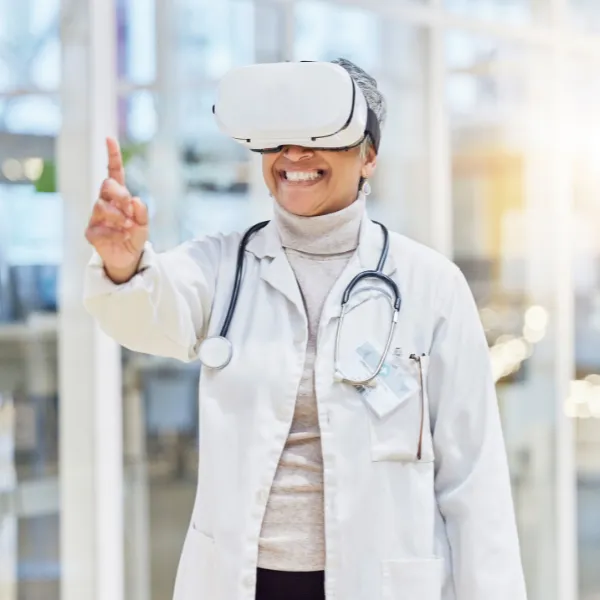
The Role Of Virtual Reality In Healthcare Staff Training
 Admin
Admin
Published Date:
27 Aug 2024,
18:30:00
Tags:
Virtual RealityHealthcareStaffingVR Healthcare TrainingPractice EnvironmentEnhanced Learning Experience
The healthcare industry is changing nowadays. As per research, the healthcare field is expected to have a shortage of up to 139000 doctors by 2033, so it’s very important to find new ways to train them.
Virtual Reality in healthcare is a new method that changes how medical professionals learn their jobs. This blog looks at how VR is changing medical education and the advantages of using VR for healthcare training.
Is your healthcare staffing agency in need of advanced software solutions? We offer customized software solutions for staffing agencies. If you need assistance, Get in touch with us now!
Why Virtual Reality in Healthcare is a Game-Changer?
Virtual Reality in Healthcare is emerging as a vital tool in medical training. The global healthcare virtual reality market is set to soar to $7.05 billion by 2026, driven by a remarkable compound annual growth rate of 34.6%. This explosive growth underscores the increasing adoption of VR technology in the healthcare sector.
Benefits of VR Healthcare Training
VR Healthcare Training offers numerous advantages, making it a game-changer in medical education. One of the most significant benefits of virtual reality in healthcare is its ability to create immersive simulations that closely mimic real-life scenarios. These simulations allow healthcare professionals to practice and refine their skills in a safe, controlled environment.
Safe Practice Environment
VR for medical staff training provides a risk-free setting where learners can perform complex procedures without endangering real patients. This controlled space is invaluable for mastering rare or high-risk procedures that are difficult to practice in traditional settings.
Enhanced Learning Experience
Immersive healthcare training through VR offers an engaging and interactive way to understand intricate medical concepts and procedures. Visual and experiential learning enhances knowledge retention and skill development.
Scalability and Accessibility
Virtual Reality in Healthcare makes advanced training more accessible to a wider audience. Institutions can deploy VR programs to train multiple users simultaneously, breaking down geographical barriers and making high-quality training available to more professionals.
See Also: How To Handle Staff Shortages during Peak Seasons In Healthcare
How VR Training Benefits Healthcare Professionals
VR Healthcare Training offers a range of benefits that significantly enhance the learning experience for healthcare professionals.
Improved Skill Acquisition
In traditional training, practicing complex procedures often involves cadavers or mannequins, which may not always replicate real-life scenarios accurately. Healthcare training with virtual reality allows for realistic, hands-on practice with virtual patients and situations that are difficult to recreate physically. This method provides a deeper understanding and better preparedness for actual clinical situations.
Risk-Free Learning
One of the notable benefits of VR in healthcare training is the ability to practice without the fear of making mistakes that could harm patients. VR simulations offer a safe space to experiment and learn from errors, which is crucial for developing confidence and competence in high-pressure situations.
Real-Time Feedback and Assessment
Virtual Reality in Healthcare Training can offer real-time feedback on performance, enabling learners to identify areas for improvement immediately. This instant feedback loop accelerates the learning process and ensures that medical staff can continually refine their skills.
Are you seeking advanced software for your healthcare recruitment firm? Our software solutions are designed to meet your specific needs. Contact us today, for assistance!
The Future of VR in Healthcare Training
The integration of Virtual Reality in Healthcare is poised to reshape medical training. With ongoing advancements in VR technology, we can expect even more sophisticated and realistic simulations. As the global healthcare virtual reality market continues to grow, the adoption of VR for training purposes is likely to become more widespread.
Scaling Training Programs
As the demand for trained healthcare professionals increases, VR training can help meet this need by offering scalable solutions. Institutions can implement VR training programs to train large numbers of professionals efficiently and effectively, ensuring a steady influx of skilled workers into the healthcare system.
Bridging the Training Gap
Given the projected shortage of physicians and other medical professionals, VR for medical staff training presents an opportunity to bridge the training gap. By leveraging Healthcare Training with Virtual Reality, we can enhance the efficiency of training programs and better prepare healthcare professionals for the challenges ahead.
See Also: How Telehealth Staffing Impact Is Shaping Healthcare Needs
Conclusion
The role of Virtual Reality in Healthcare is transformative, offering numerous benefits that are reshaping medical education. From providing a safe & positive environment for practice to delivering immersive learning experiences, VR technology is enhancing how healthcare professionals are trained.
As the global market for healthcare virtual reality continues to expand, the future of VR Healthcare Training looks promising. By embracing these innovations, we can address the impending shortage of medical professionals and ensure that our healthcare system remains robust and responsive.
Virtual reality in healthcare training is a big jump towards a future where learning to be a doctor or nurse is more useful, fun, and easily accessible.
Are you looking to enhance your home care staffing agency with innovative software solutions? Our experts can create customized applications to meet your unique needs. Reach out to us now, for assistance!
FAQs
Q1. What is Virtual Reality in Healthcare Training?
Virtual reality in healthcare training allows medical professionals to experience hands-on training in life-threatening simulations and procedures using immersive VR technology. It allows healthcare professionals to practice the skills in a controlled and safe manner.
Q2. What are the main benefits of VR for medical staff training?
The key benefits comprise a no-risk environment for practice and an enriched learning experience by allowing accelerated skill acquisition and live feedback. This adds to the experience of healthcare professionals and builds confidence that leads them to be competent enough at managing challenging cases.
Q3. How does VR Healthcare Training improve learning compared to traditional methods?
VR Healthcare Training gives you a hands-on interactive experience that is difficult if not impossible to replicate through traditional methods. This provides real world simulated scenarios that help you be able to remember better medical concepts.
Q4. Can VR training be used to practice rare or high-risk procedures?
Yes, VR training is perfect for rare or high-risk procedures. It is a place where an attempt can be made to simulate these complicated tasks, but without endangering real patients.
Q5. How can Virtual Reality in Healthcare address the shortage of medical professionals?
VR technology can more easily be used to scale training programs and offer accessible, top-notch education for numerous professionals. This helps to mitigate the shortage by training more people faster to fill up gaps in a rapidly increasing need for healthcare professionals.
Comments
Published Date: 27 Aug 2024, 18:30:00
The healthcare industry is changing nowadays. As per research, the healthcare field is expected to have a shortage of up to 139000 doctors by 2033, so it’s very important to find new ways to train them.
Virtual Reality in healthcare is a new method that changes how medical professionals learn their jobs. This blog looks at how VR is changing medical education and the advantages of using VR for healthcare training.
Is your healthcare staffing agency in need of advanced software solutions? We offer customized software solutions for staffing agencies. If you need assistance, Get in touch with us now!
Why Virtual Reality in Healthcare is a Game-Changer?
Virtual Reality in Healthcare is emerging as a vital tool in medical training. The global healthcare virtual reality market is set to soar to $7.05 billion by 2026, driven by a remarkable compound annual growth rate of 34.6%. This explosive growth underscores the increasing adoption of VR technology in the healthcare sector.
Benefits of VR Healthcare Training
VR Healthcare Training offers numerous advantages, making it a game-changer in medical education. One of the most significant benefits of virtual reality in healthcare is its ability to create immersive simulations that closely mimic real-life scenarios. These simulations allow healthcare professionals to practice and refine their skills in a safe, controlled environment.
Safe Practice Environment
VR for medical staff training provides a risk-free setting where learners can perform complex procedures without endangering real patients. This controlled space is invaluable for mastering rare or high-risk procedures that are difficult to practice in traditional settings.
Enhanced Learning Experience
Immersive healthcare training through VR offers an engaging and interactive way to understand intricate medical concepts and procedures. Visual and experiential learning enhances knowledge retention and skill development.
Scalability and Accessibility
Virtual Reality in Healthcare makes advanced training more accessible to a wider audience. Institutions can deploy VR programs to train multiple users simultaneously, breaking down geographical barriers and making high-quality training available to more professionals.
See Also: How To Handle Staff Shortages during Peak Seasons In Healthcare
How VR Training Benefits Healthcare Professionals
VR Healthcare Training offers a range of benefits that significantly enhance the learning experience for healthcare professionals.
Improved Skill Acquisition
In traditional training, practicing complex procedures often involves cadavers or mannequins, which may not always replicate real-life scenarios accurately. Healthcare training with virtual reality allows for realistic, hands-on practice with virtual patients and situations that are difficult to recreate physically. This method provides a deeper understanding and better preparedness for actual clinical situations.
Risk-Free Learning
One of the notable benefits of VR in healthcare training is the ability to practice without the fear of making mistakes that could harm patients. VR simulations offer a safe space to experiment and learn from errors, which is crucial for developing confidence and competence in high-pressure situations.
Real-Time Feedback and Assessment
Virtual Reality in Healthcare Training can offer real-time feedback on performance, enabling learners to identify areas for improvement immediately. This instant feedback loop accelerates the learning process and ensures that medical staff can continually refine their skills.
Are you seeking advanced software for your healthcare recruitment firm? Our software solutions are designed to meet your specific needs. Contact us today, for assistance!
The Future of VR in Healthcare Training
The integration of Virtual Reality in Healthcare is poised to reshape medical training. With ongoing advancements in VR technology, we can expect even more sophisticated and realistic simulations. As the global healthcare virtual reality market continues to grow, the adoption of VR for training purposes is likely to become more widespread.
Scaling Training Programs
As the demand for trained healthcare professionals increases, VR training can help meet this need by offering scalable solutions. Institutions can implement VR training programs to train large numbers of professionals efficiently and effectively, ensuring a steady influx of skilled workers into the healthcare system.
Bridging the Training Gap
Given the projected shortage of physicians and other medical professionals, VR for medical staff training presents an opportunity to bridge the training gap. By leveraging Healthcare Training with Virtual Reality, we can enhance the efficiency of training programs and better prepare healthcare professionals for the challenges ahead.
See Also: How Telehealth Staffing Impact Is Shaping Healthcare Needs
Conclusion
The role of Virtual Reality in Healthcare is transformative, offering numerous benefits that are reshaping medical education. From providing a safe & positive environment for practice to delivering immersive learning experiences, VR technology is enhancing how healthcare professionals are trained.
As the global market for healthcare virtual reality continues to expand, the future of VR Healthcare Training looks promising. By embracing these innovations, we can address the impending shortage of medical professionals and ensure that our healthcare system remains robust and responsive.
Virtual reality in healthcare training is a big jump towards a future where learning to be a doctor or nurse is more useful, fun, and easily accessible.
Are you looking to enhance your home care staffing agency with innovative software solutions? Our experts can create customized applications to meet your unique needs. Reach out to us now, for assistance!
FAQs
Q1. What is Virtual Reality in Healthcare Training?
Virtual reality in healthcare training allows medical professionals to experience hands-on training in life-threatening simulations and procedures using immersive VR technology. It allows healthcare professionals to practice the skills in a controlled and safe manner.
Q2. What are the main benefits of VR for medical staff training?
The key benefits comprise a no-risk environment for practice and an enriched learning experience by allowing accelerated skill acquisition and live feedback. This adds to the experience of healthcare professionals and builds confidence that leads them to be competent enough at managing challenging cases.
Q3. How does VR Healthcare Training improve learning compared to traditional methods?
VR Healthcare Training gives you a hands-on interactive experience that is difficult if not impossible to replicate through traditional methods. This provides real world simulated scenarios that help you be able to remember better medical concepts.
Q4. Can VR training be used to practice rare or high-risk procedures?
Yes, VR training is perfect for rare or high-risk procedures. It is a place where an attempt can be made to simulate these complicated tasks, but without endangering real patients.
Q5. How can Virtual Reality in Healthcare address the shortage of medical professionals?
VR technology can more easily be used to scale training programs and offer accessible, top-notch education for numerous professionals. This helps to mitigate the shortage by training more people faster to fill up gaps in a rapidly increasing need for healthcare professionals.


